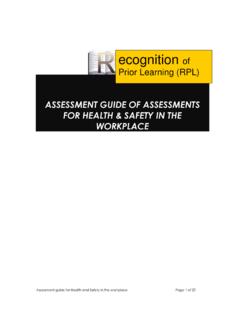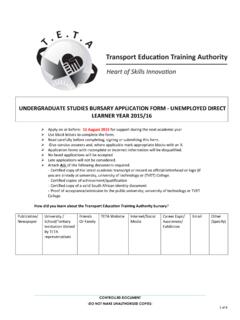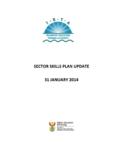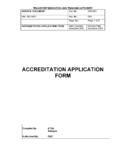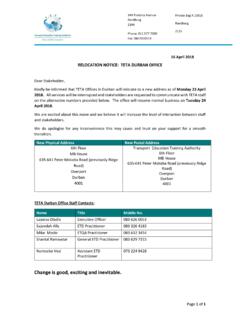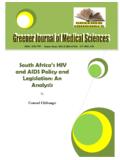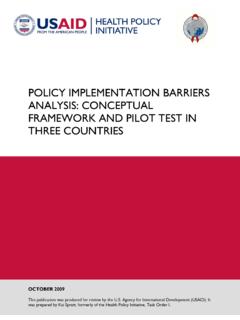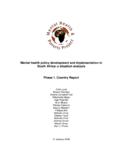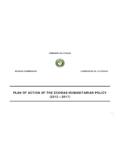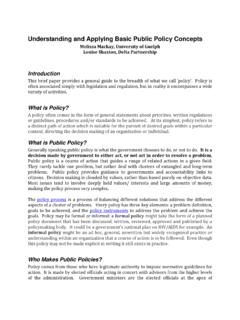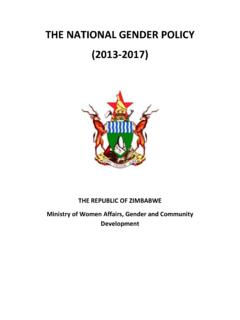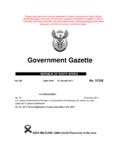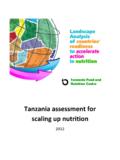Transcription of FACTORS INFLUENCING FUTURE CHANGES WITHIN THE …
1 FACTORS INFLUENCING FUTURE CHANGES WITHIN THE CHAMBER Maritime Chamber , provides an analysis of FUTURE developments WITHIN the Chamber as they relate to skills development. Policies - Globalisation demands higher standards of product & service quality, management skills and market response times. Measuring against international best practices and training employees to ever-improved standards of work will be essential for business survival; - Labour legislation aimed at the accelerated advancement of previously disadvantaged groups, greater workplace democratisation and more structured employment relationships, will result in substantial increases in education & training in the fields of HR management, industrial relations and skills development; - Restructuring of the fishing industry via the general policy on the allocation and management of long term commercial fishing rights (2005) will lead to numerous new entrants obtaining access rights and quotas for the first time.
2 Skills development for these in both business management and technology will be required; - South African Maritime Safety Authority (SAMSA) continues to generate new regulations for all vessels operating in South African waters. This is particularly valid in the light of s accession to the International Maritime Organisations ( ) conventions on Safety, Training, Certification and Watch keeping for all seafarers. These now apply equally to merchant marine and fishing craft operating in Waters. Substantial training to ensure compliance with these laws by all concerned will have to take place. The Skills Development Fund may be needed to finance components of this; - In addition to the above, SAMSA s regulations are generally considered to be extremely onerous for SMME s and owners of smaller craft.
3 Compliance will not only require additional skills development, but may well prove to be too expensive for smaller operators; - The National Commercial Ports Policy, the drive towards efficiency and competitiveness in ports and greater participation by the private sector in port operations are likely to require additional management and technical skills; - The Chamber will actively pursue black empowerment initiatives with measurable outcomes. This will be done through co-operation between stakeholders government, labour and business with the objective to create opportunities for economic growth, investment and job creation; - The Chamber will encourage the trend toward compliance with policies and systems of international parent companies as well accreditation towards international standardisation.
4 Economic - Increasing global and local competition as well as the trend for large international players to acquire Maritime and fishing companies will impact here. Continuous improvement to operating standards will require new skills to be developed. Multi-skilling of operating workforces will become more prevalent. Sufficiently skilled people to meet these new demands may be in short supply. If not addressed, this could lead to lost job/business opportunities locally; - Fewer, larger vessels will lead to more highly skilled crews being required; - Stringent EU requirements for quality of exports will place additional demands on workforces; - The sector contains almost unlimited opportunity for increased SMME participation and a corresponding increase in job opportunities.
5 Recent policy CHANGES have improved the legislative and taxation environment for SMME participation but technological and skills demands might be high due to the nature of the industries concerned; - The introduction of an alternative taxation system for the shipping industry and the anticipated growth of the SA Ships Register may place an additional burden on the demand for seafarer training; - The overall skills impact on the sector in that it aims to address key strategic challenges faced by the sector, the poor cost and service in ports as well as global shipping backhaul; Social - AIDS pandemic poses a major threat as the majority of people affected in are part of the economically active age groups; - Limited skills pool implies that the cost of skilled labour will increase at a higher rate than the CPI; - Legacy of a generally poorly educated workforce represents a constraint for skills development.
6 Massive amounts of workplace-based learning are urgently required to counteract this; - High age profile and natural staff attrition of skilled personnel. The combined effect of retirement and long lead times of training render it difficult to close the competency gap satisfactorily; - Creating greater portability of skills between the SA merchant and fishing sectors represents a major challenge. An historical divide would need to be bridged in order for longitudinal career paths to be established in this instance; - Employee Assistance Programs would need to be implemented to assist with the health and welfare of employees with regards to life skills, stress management. Technological - Higher skills entry levels into the industry will result from ever-improving technologies.
7 Retraining of existing employees in new equipment and processes will also increase; - Advancements in information technology places greater pressure on operating staff in respect of conformance to customer or home base requirements, response times, etc.; - ECommerce and web-browser capabilities will have a substantial impact on B2B transactions particularly in the merchant marine industry. Computer skills development needs may also increase; - It is envisaged that advances in technology will result in improved and simplified maintenance as well as a shift from equipment faultfinding and repair to systems diagnostics competencies requiring people to be re-trained and re-skilled; - Advances in technology may lead to job losses. Initiatives would need to be put in place to re-train and replace redundant employees.
8 The impact of the skills loss in the sector would also necessitate that people be re-trained and re-skilled. - There is a need for life-long learning. This will impact on the provision and delivery of learning methodologies and simultaneously creating a competitive environment for such providers; - It is feared that the high cost of advanced technology ( simulators) put training out of reach of the very people it intended to assist; restricting access and availability to such technology. This would need to be addressed. Environmental - Knowledge of international environmental standards will follow the increasing globalisation of SA businesses. Improved pollution control and disaster management skills may be needed; - Transportation of hazardous substances requires specialised training of crews concerned; - Transportation safety standards ( STCW-F) may require additional pre-sea training of new entrants to the industry; - There is a need for greater research and more reliable information on marine eco-system and environment.
9 In addition, education programmes may be initiated to ensure the protection of the environment; - Fishing operating procedures and techniques need to be reviewed in order to ensure that such all activities are environmentally friendly. Legislation 1. Specific legislation impacting on the industry: - Marine Living Resources Act - Maritime Safety Authority Act - Merchant Shipping Act - SA Ships Registration Act - SA Harbour Regulations 2. Generic legislation that also has an impact, include: - Qualifications Authority Act - Employment Equity Act - Basic Conduction of Employment Act - Labour Relations Acts - Skills Development Act - Skills Development Levies Act - Occupational Health & Safety Act 3. Besides the identifiable generic and specific legislation the following are deemed to have an impact on industry: - SA Constitution - MARPOL - SOLAS - IMO/ILO Conventions - Income Tax Act - Admiralty Jurisdiction Regulation Act - SA Immigration Act - Occupational Health & Safety Act - Compensations for Occupational Diseases and Injuries Act SWOT analysis The Chamber SWOT analysis provides an indication of the status of the sector to implement the Skills Development Strategy.
10 Strengths A high commitment to education and training - although many (smaller) enterprises are not fully conversant with the systems which have been put in place by the NSDS. The existence of structured career paths WITHIN certain sub-sectors. To a large extent, the qualifications (or critical / safety related skills) required in the sector are legislated and internationally recognised / comparable. Strong seafarer training tradition and a history of producing highly competent merchant navy officers. High level of expertise in operational, technical and management fields. Relatively good access to NSF funding and improved access to training for SMMEs through SETA initiatives / projects. Weaknesses Slow progress with SAQA risation , unit standards as well as slow progress with industry s conversion towards the SAQA processes, assessment, mentoring, accredited providers, etc.
